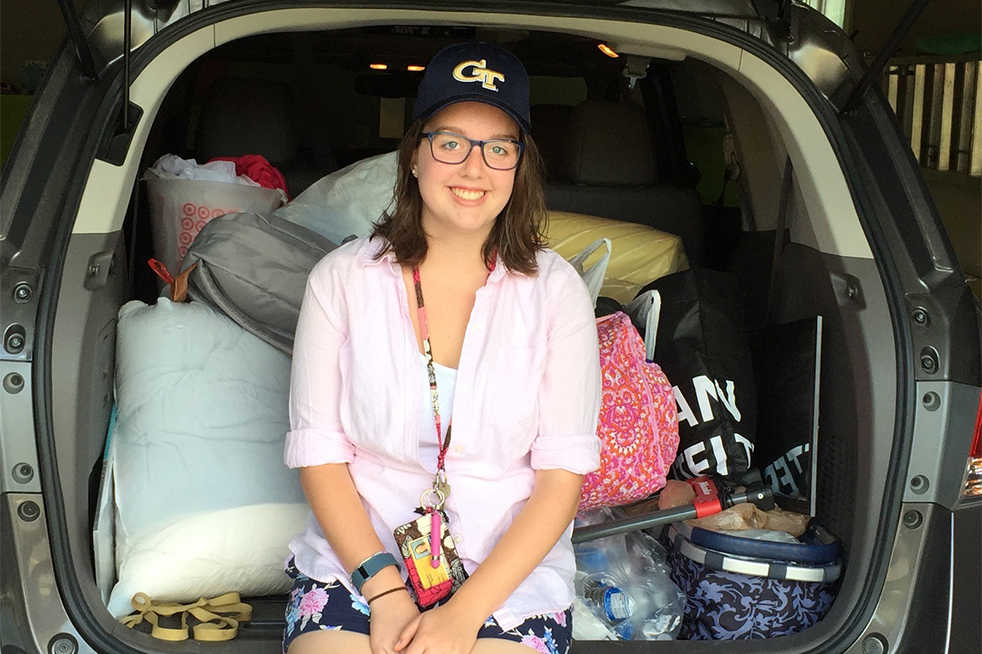Most patrons of this year’s Music Midtown have a story and a variety of colorful complaints about their unconventional Sunday at the festival. For my part, I was waiting for Grouplove to take the stage for their 4:35 p.m. show when it started. Bright red signs flashed up on the stage’s flanking screens: WEATHER EVACUATION. PLEASE CALMLY HEAD TO THE NEAREST EXIT. My friend and I did so, though a group next to us in the crowd started chanting “bullshit” instead, and in a single mass our crowd turned around and shuffled through security gates that were either open or askew enough to squeeze through. Other stages’ bands could still be faintly heard playing as we made our exit.
“Monitor social media for updates” is not a terribly helpful instruction when one has no service and a phone all too vulnerable to water in a downpour, but beyond “leave the park” that is all the instruction we were given. Once those too stubborn to leave were forced out by security personnel, there were hundreds who simply stood in the street by the entrance gates and resolved to wait it out.
Some huddled underneath some of the porticos of Grady High School, and many went back to their hotels or apartments. My friend and I eventually scooched underneath a sponsorship tent and received free Clif Bars for our trouble while we tried to pull up weather radars, and the festival organizers remained mostly silent for about an hour.
There were indeed lightning strikes in the area, roughly three miles from our location, and for that reason I understand why an evacuation was necessary. What I do not understand, however, is how simply vacating the park made us safer. If lightning had struck the Electric Ballroom Stage or the Roxy Stage, which were right along the perimeter fences, people still would have been hurt.
Those of us — realistically, all of us — who were standing in gigantic puddles of water were not particularly safe. If one ignores the obvious and alluring shift of liability once a potential victim leaves the festival, there was no tangible increase in safety. If anything, the densely-packed throngs on 10th Street were more dangerous, given the degree of confusion and lack of organization.
This begs the question of whether LiveNation organizers and law enforcement put adequate consideration into the patrons they would be corralling in an emergency: thousands of people, mostly very young, and at the very least half of whom were heavily intoxicated on some substance or another. These people may have been separated from the groups they came with, purposely or by virtue of the festival’s hectic environment — depending on their cell carrier and location in the park, they may not have been able to reach anyone.
Regardless of the actual nature of the threat, these patrons are going to be belligerent at best and frightened at most. In what quickly became a torrential rain, I saw plenty of both as we all shuffled out of the park and into the too-narrow expanse of 10th Street. I watched a girl get inordinately excited about the six-inch-deep water rushing down the street into a distant storm drain, before drunkenly grabbing a scrap of cardboard and attempting to float down the “river.” Is the expectation that these people are going to be able to guide themselves to safety on their own?
Even with explicit instructions and consistent lines of communication, a significant number of people would have had difficulty receiving and understanding them. Without those things, a legitimate and immediate threat to life than the storm could potentially have been devastating.
Even when the park reopened about an hour later, after social media announcements and word of mouth trickled out information, some security guards were unclear about what was transpiring and tried to prevent people from approaching the gates. A poster on Reddit claims that one guard was never made aware that the evacuation was for weather, and thought that it had been a bomb threat.
Though many people had gone home or back to their hotels, a sizeable portion had never left 10th Street and the surrounding area and proceeded to storm the entrance gates. No further bag check was conducted, and people literally bolted and shoved their way down the hill and to the stage of their choice. Perhaps the only well-executed component of the whole incident was the announcement of schedule changes, which were posted on the same electronic boards that had been used to initiate the evacuation.
I have no experience in emergency preparedness or planning for the unexpected in events of this caliber, but even as an amateur I have to assume something could have been done better. The Atlanta Police Department had a vague presence outside the festival and could have lent some of their tangible authority to getting people out of the park quickly. Phased evacuations of select areas could have been used more effectively, if the festival had the personnel to do so.
Evacuation zones could have been set in the Grady gym across the street, or under tents specifically meant for this purpose, or in any location other than “not the park.” Internal communications could have been improved to the point where customer service was active on social media and engaging with the people outside.
Should such an occurrence happen at a future Music Midtown, my hope is that organizers will take heed of this year’s sloppiness and know that anything they do differently will be better than nothing.
